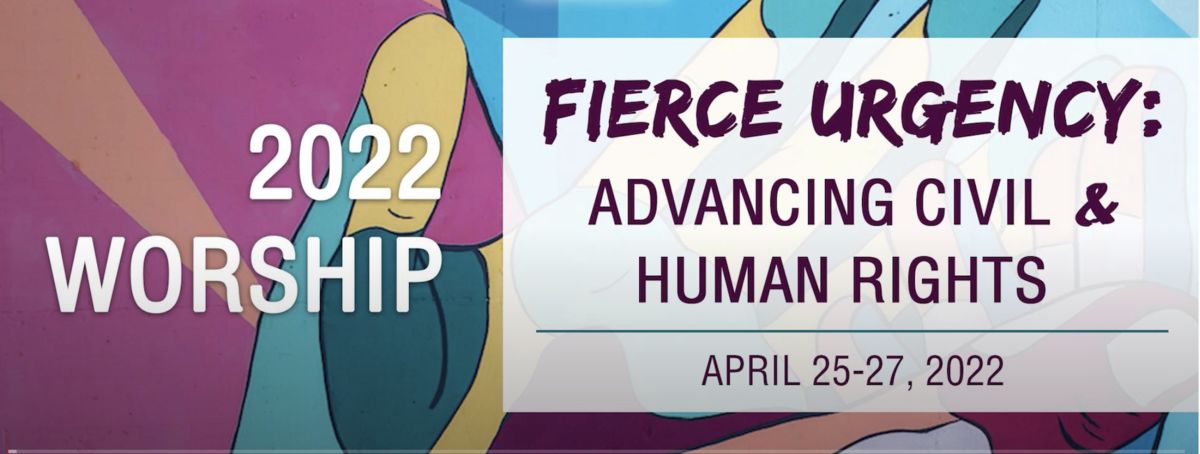2022 Ecumenical Advocacy Days Push Actions to Advance Civil and Human Rights
PART TWO: Human Rights: Philippines, Palestine/Israel, Colombia

This is a two-part series highlighting the Ecumenical Advocacy Days (EAD) Conference that took place April 25 – 27, 2022.
Over the course of three days, more than 500 people of faith gathered virtually to learn, pray, worship and advocate for civil and human rights. The EAD virtual conference included two plenaries: One on the U.S. issue of voting rights and one addressing global human rights.
The International Human Rights panel heard from experts on the current state of human rights in the Philippines, Israel/Palestine and Colombia. The panel was moderated by Derek Duncan, East Asia and the Pacific Area Executive for Global Ministries of the Christian Church (Disciples of Christ) and the United Church of Christ.
Bishop Reuel Marigza, General Secretary at National Council of Churches-Philippines, Martin Nates, Executive Director of Justapaz in Colombia and Zeina Ashrawi Hutchison, Advocacy Officer at Defense for Children International -Palestine all spoke passionately about the human rights issues facing their communities. Below is a synopsis of their comments.
Philippines’ Devastating Human Rights Trend
“The human rights situation in the Philippines has reached an alarming degree,” said Bishop Reuel Marigza, General Secretary of the National Council of Churches – Philippines. “Human rights defenders are themselves becoming victims of human rights violations…. There is something very wrong when those who advocate for human rights and defend it end up becoming victims themselves and need to be defended as well.”
According to Bishop Reuel, the shift in the military thinking has led to the vilification or red-painting and red-tagging, a term used for intimidating journalists, peace activists and human rights defenders, who are labeled as enemies. It’s the filing of trumped-up charges, and in extrajudicial killings of civilians suspected or judged as enemies of the state.”
Bishop Marigza noted that the state had even frozen the accounts of the United Church of Christ- Philippines Southeast when they had offered sanctuary to the Lumad indigenous people in Davao. The use of red painting and red tagging has made it more difficult for civil society organizations and churches to accompany and advocate for the least and the lost among Filipino society.
“As no one is an island, there is the need to build and develop communities of support and to build and strengthen a global coalition and network of ecumenical, inter-religious and worldwide movements in solidarity pushing for the observance and defense for human rights as well as the upholding and respect of human dignity,” said Bishop Marigza.
Palestine/Israel’s Continuous Human Rights Struggle
A Palestinian born in Jerusalem and raised in Ramallah, Zeina Ashrawi Hutchison, Advocacy Officer at Defense for Children International Palestine, opened her remarks saying, “It is essential to re-iterate that Palestinians did not initiate, instigate, or choose the daily struggle for liberation or freedom for the past 73+ years.” She recalled the human rights violations of mass graves of Palestinians dating from as early as 1948 up to May 2021.
Ashrawi Hutchinson noted that she struggled to answer the question of the current state of human rights, because oppression for Palestinians is contiguous. “In May 2021 in the Gaza Strip, 261 people were instantly killed including 67 children. There isn’t a start or an end,” she said.
“The trauma under apartheid is generational. The struggle for freedom and our rights is inherited and unavoidable. The anger and frustration is understandable and under-rated….No Palestinian is spared whether they are on the ground in Palestine or anywhere else in the world, and that is by design.”
Since the beginning of 2022, 47 Palestinians have been killed, eight of them children. There have been at least two military raids on Palestinian universities. There are an estimated 4,400 political prisoners in military jails, and over 500 in administrative detention without charge or trial. An estimated 500-700 Palestinian children are being held in Israeli military institutions.
“This is about integrity. This about centering life and humanity,” Ashrawi Hutchinson said. “Congress has begun to shift a bit on the issue and I encourage everyone to seek solidarity in advocating for basic human rights.”
Colombia’s Repressive Human Rights Violations
Martin Nates, Executive Director of Justapaz in Bogota, Colombia, shared his perspective on the human rights violations in Colombia.
According to Nates, after military conflict and a 2016 peace agreement there was much hope for the rebuilding of the country. However, in recent years, under President Duque, the country has been increasingly repressive, particularly to women, children, indigenous communities of African descent, and human rights defenders.
Between 2016-2021, more than 300 ex-combatants and 477 human rights defenders and civic leaders have been killed, according to data from the United Nations Verification Mission in Colombia.
“In 2021, young people made demands for the implementation of the peace agreement with respect to Human Rights,” Nates reported. “They wanted to move forward on decent employment issues. The response of the state was repression.”
Nates also declared the presence of U.S. military has exacerbated the conflict and there have been reports of sexual and gender-based violence related to the U.S. military. Nates urged EAD participants to call on the U.S. Congress to ensure U.S. resources and cooperation are issued to support human rights, and not war.
Colombia is slated to have the next government administration take office on August 7, 2022